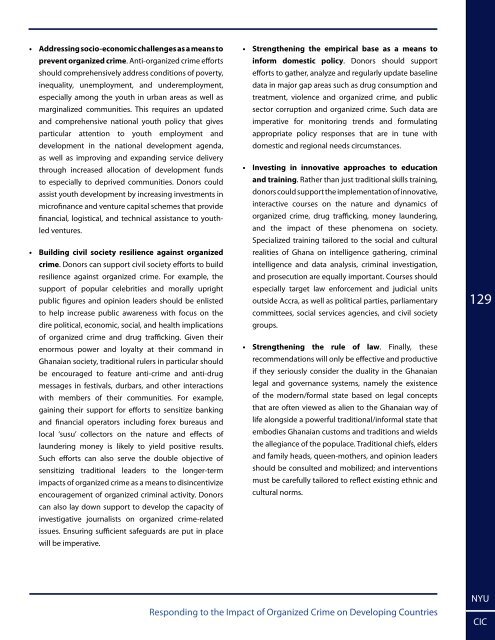here - Center on International Cooperation - New York University
here - Center on International Cooperation - New York University
here - Center on International Cooperation - New York University
You also want an ePaper? Increase the reach of your titles
YUMPU automatically turns print PDFs into web optimized ePapers that Google loves.
• Addressing socio-ec<strong>on</strong>omic challenges as a means to<br />
prevent organized crime. Anti-organized crime efforts<br />
should comprehensively address c<strong>on</strong>diti<strong>on</strong>s of poverty,<br />
inequality, unemployment, and underemployment,<br />
especially am<strong>on</strong>g the youth in urban areas as well as<br />
marginalized communities. This requires an updated<br />
and comprehensive nati<strong>on</strong>al youth policy that gives<br />
particular attenti<strong>on</strong> to youth employment and<br />
development in the nati<strong>on</strong>al development agenda,<br />
as well as improving and expanding service delivery<br />
through increased allocati<strong>on</strong> of development funds<br />
to especially to deprived communities. D<strong>on</strong>ors could<br />
assist youth development by increasing investments in<br />
microfinance and venture capital schemes that provide<br />
financial, logistical, and technical assistance to youthled<br />
ventures.<br />
• Building civil society resilience against organized<br />
crime. D<strong>on</strong>ors can support civil society efforts to build<br />
resilience against organized crime. For example, the<br />
support of popular celebrities and morally upright<br />
public figures and opini<strong>on</strong> leaders should be enlisted<br />
to help increase public awareness with focus <strong>on</strong> the<br />
dire political, ec<strong>on</strong>omic, social, and health implicati<strong>on</strong>s<br />
of organized crime and drug trafficking. Given their<br />
enormous power and loyalty at their command in<br />
Ghanaian society, traditi<strong>on</strong>al rulers in particular should<br />
be encouraged to feature anti-crime and anti-drug<br />
messages in festivals, durbars, and other interacti<strong>on</strong>s<br />
with members of their communities. For example,<br />
gaining their support for efforts to sensitize banking<br />
and financial operators including forex bureaus and<br />
local ‘susu’ collectors <strong>on</strong> the nature and effects of<br />
laundering m<strong>on</strong>ey is likely to yield positive results.<br />
Such efforts can also serve the double objective of<br />
sensitizing traditi<strong>on</strong>al leaders to the l<strong>on</strong>ger-term<br />
impacts of organized crime as a means to disincentivize<br />
encouragement of organized criminal activity. D<strong>on</strong>ors<br />
can also lay down support to develop the capacity of<br />
investigative journalists <strong>on</strong> organized crime-related<br />
issues. Ensuring sufficient safeguards are put in place<br />
will be imperative.<br />
• Strengthening the empirical base as a means to<br />
inform domestic policy. D<strong>on</strong>ors should support<br />
efforts to gather, analyze and regularly update baseline<br />
data in major gap areas such as drug c<strong>on</strong>sumpti<strong>on</strong> and<br />
treatment, violence and organized crime, and public<br />
sector corrupti<strong>on</strong> and organized crime. Such data are<br />
imperative for m<strong>on</strong>itoring trends and formulating<br />
appropriate policy resp<strong>on</strong>ses that are in tune with<br />
domestic and regi<strong>on</strong>al needs circumstances.<br />
• Investing in innovative approaches to educati<strong>on</strong><br />
and training. Rather than just traditi<strong>on</strong>al skills training,<br />
d<strong>on</strong>ors could support the implementati<strong>on</strong> of innovative,<br />
interactive courses <strong>on</strong> the nature and dynamics of<br />
organized crime, drug trafficking, m<strong>on</strong>ey laundering,<br />
and the impact of these phenomena <strong>on</strong> society.<br />
Specialized training tailored to the social and cultural<br />
realities of Ghana <strong>on</strong> intelligence gathering, criminal<br />
intelligence and data analysis, criminal investigati<strong>on</strong>,<br />
and prosecuti<strong>on</strong> are equally important. Courses should<br />
especially target law enforcement and judicial units<br />
outside Accra, as well as political parties, parliamentary<br />
committees, social services agencies, and civil society<br />
groups.<br />
• Strengthening the rule of law. Finally, these<br />
recommendati<strong>on</strong>s will <strong>on</strong>ly be effective and productive<br />
if they seriously c<strong>on</strong>sider the duality in the Ghanaian<br />
legal and governance systems, namely the existence<br />
of the modern/formal state based <strong>on</strong> legal c<strong>on</strong>cepts<br />
that are often viewed as alien to the Ghanaian way of<br />
life al<strong>on</strong>gside a powerful traditi<strong>on</strong>al/informal state that<br />
embodies Ghanaian customs and traditi<strong>on</strong>s and wields<br />
the allegiance of the populace. Traditi<strong>on</strong>al chiefs, elders<br />
and family heads, queen-mothers, and opini<strong>on</strong> leaders<br />
should be c<strong>on</strong>sulted and mobilized; and interventi<strong>on</strong>s<br />
must be carefully tailored to reflect existing ethnic and<br />
cultural norms.<br />
129<br />
Resp<strong>on</strong>ding to the Impact of Organized Crime <strong>on</strong> Developing Countries<br />
NYU<br />
CIC
















